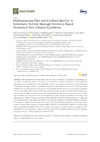Identificador persistente para citar o vincular este elemento:
https://accedacris.ulpgc.es/jspui/handle/10553/69848
| Título: | Mediterranean diet and cardiodiabesity: A systematic review through evidence-based answers to key clinical questions | Autores/as: | Franquesa, Marcella Pujol-Busquets, Georgina García-Fernández, Elena Rico, Laura Shamirian-Pulido, Laia Aguilar-Martínez, Alicia Medina, Francesc Xavier Serra Majem, Luis Bach-Faig, Anna |
Clasificación UNESCO: | 3206 Ciencias de la nutrición | Palabras clave: | Cardiodiabesity Cardiovascular Disease Diabetes Mellitus Mediterranean Diet Metabolic Syndrome, et al. |
Fecha de publicación: | 2019 | Publicación seriada: | Nutrients | Resumen: | The Mediterranean Diet (MedDiet) has been promoted as a means of preventing and treating cardiodiabesity. The aim of this study was to answer a number of key clinical questions (CQs) about the role of the MedDiet in cardiodiabesity in order to provide a framework for the development of clinical practice guidelines. A systematic review was conducted to answer five CQs formulated using the Patient, Intervention, Comparison, and Outcome (PICO) criteria. Twenty articles published between September 2013 and July 2016 were included, adding to the 37 articles from the previous review. There is a high level of evidence showing that MedDiet adherence plays a role in the primary and secondary prevention of cardiovascular disease (CVD) and improves health in overweight and obese patients. There is moderate-to-high evidence that the MedDiet prevents increases in weight and waist circumference in non-obese individuals, and improves metabolic syndrome (MetS) and reduces its incidence. Finally, there is moderate evidence that the MedDiet plays primary and secondary roles in the prevention of type 2 diabetes mellitus (T2DM). The MedDiet is effective in preventing obesity and MetS in healthy and at-risk individuals, in reducing mortality risk in overweight or obese individuals, in decreasing the incidence of T2DM and CVD in healthy individuals, and in reducing symptom severity in individuals with T2DM or CVD. | URI: | https://accedacris.ulpgc.es/handle/10553/69848 | ISSN: | 2072-6643 | DOI: | 10.3390/nu11030655 | Fuente: | Nutrients [ISSN 2072-6643], v. 11 (3), 655, (Marzo 2019) |
| Colección: | Reseña |
Citas SCOPUSTM
92
actualizado el 08-jun-2025
Citas de WEB OF SCIENCETM
Citations
81
actualizado el 08-feb-2026
Visitas
70
actualizado el 10-ene-2026
Google ScholarTM
Verifica
Altmetric
Comparte
Exporta metadatos
Los elementos en ULPGC accedaCRIS están protegidos por derechos de autor con todos los derechos reservados, a menos que se indique lo contrario.
